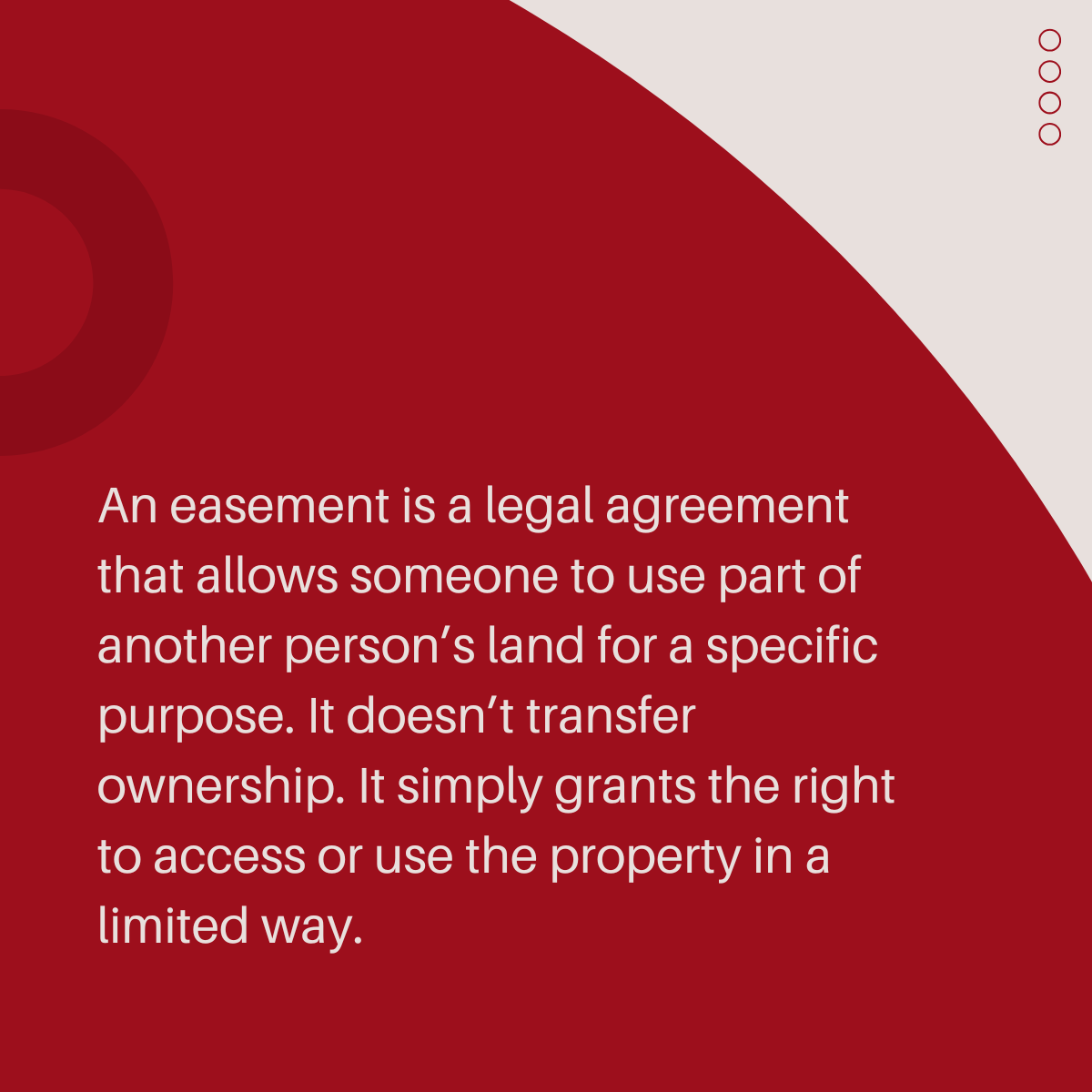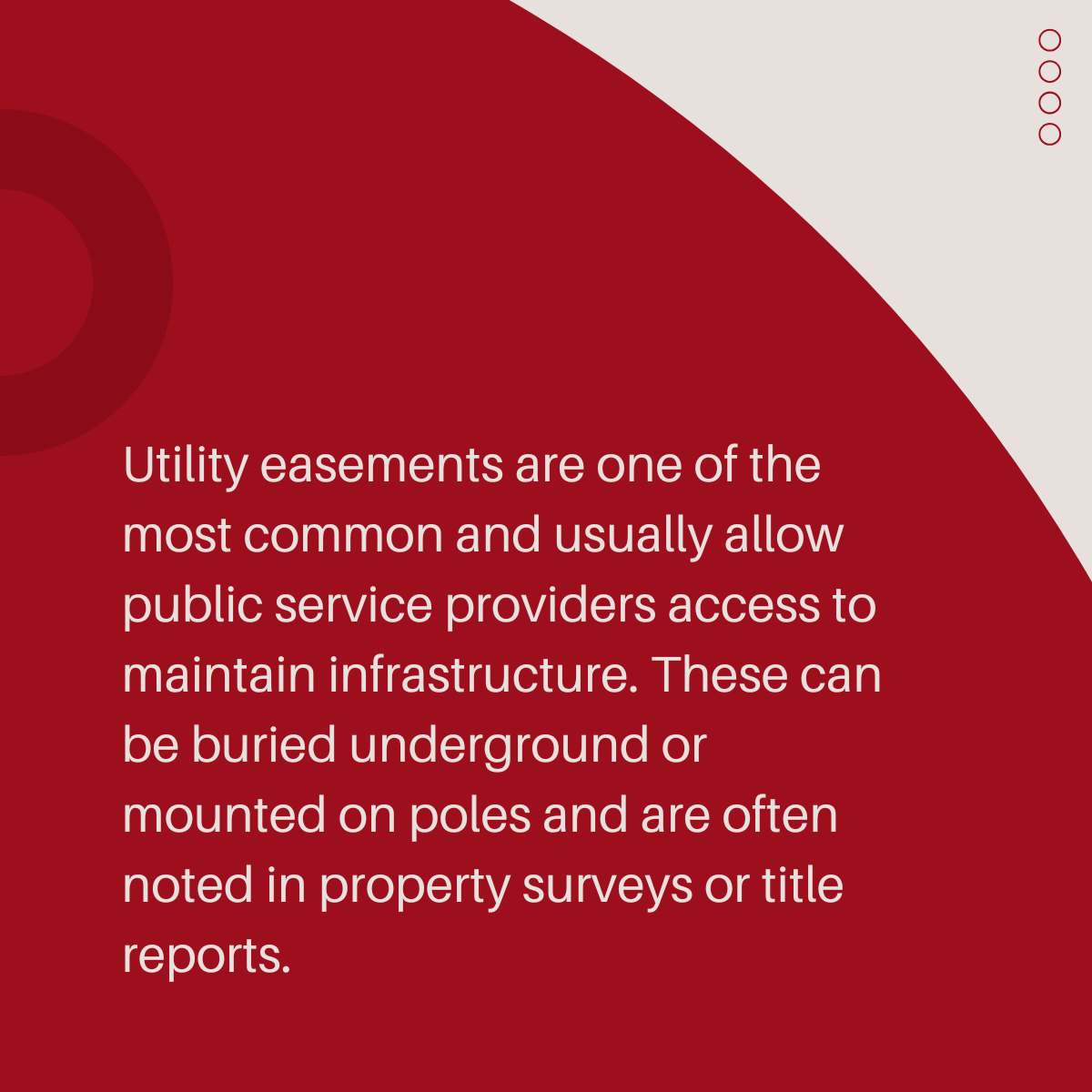
What is Easement in Real Estate?
Before you buy or develop property, there’s one detail, among others, that you don’t want to overlook: easements. In real estate, an easement gives someone the legal right to use part of a property they don’t own, like a shared driveway, utility access, or walking path. It impacts how land is used, developed, or sold.
Understanding easements in real estate is essential whether you’re dealing with a home, vacant land, or commercial property. In this guide, we’ll explain what easements mean, the different types you might encounter, and when it’s smart to consult a real estate attorney before moving forward.
Easements Meaning: What Is an Easement?
An easement is a legal agreement that allows someone to use part of another person’s land for a specific purpose. It doesn’t transfer ownership. It simply grants the right to access or use the property in a limited way.
For example, if a neighbor’s driveway crosses a corner of your land, that access may be protected by an easement. The same goes for utility companies that need to install or maintain power lines, water pipes, or sewer systems beneath private property.
There are two key things to understand about land easements:
- Easements stay with the property, not the person. If the land is sold, the easement typically remains in place.
- Easements can be written into the property deed, created by long-term use, or granted through legal action.
While easements are often straightforward, they can also lead to confusion or disputes, especially when property owners aren’t fully aware of what’s in place.

Types of Easements
Understanding the different types can help you know what to expect and how they might affect your property rights.
1. Appurtenant Easement
This type of easement involves two properties: a dominant estate (the one benefiting from the easement) and a servient estate (the one giving access). For example, if Property A needs to cross Property B’s land to reach the road, Property A holds an appurtenant easement. These easements stay with the land, even when ownership changes.
2. Easement in Gross
Unlike appurtenant easements, an easement in gross benefits a person or company rather than another property. Utility companies commonly hold easements in gross to install and maintain power lines, pipelines, or cables.
3. Prescriptive Easement
This occurs when someone uses another person’s land openly, continuously, and without permission for a legally defined period of time. If the owner doesn’t stop the use, the user may gain a legal right to continue using it similar to “adverse possession,” but for access rather than ownership.
4. Utility Easement
Utility easements are one of the most common and usually allow public service providers access to maintain infrastructure. These can be buried underground or mounted on poles and are often noted in property surveys or title reports.
Each type of easement can have different implications, especially for developers or buyers of commercial property. That’s why it’s smart to consult a commercial real estate attorney if you’re unsure how an easement might impact your plans.

Source: Freepik
Easements in Commercial Real Estate
Easements are especially important in commercial real estate, where access, infrastructure, and long-term development plans can be directly affected. Overlooking an easement could mean delays, added costs, or limitations on how a property can be used.
1. Access and Entry Points
For businesses that rely on deliveries, customer parking, or emergency access, an easement might govern how vehicles can enter or exit the property. If access is limited by another party’s control, it can disrupt operations or reduce usability.
2. Shared Infrastructure
Easements may apply to shared walls, pipes, signage, or parking lots. These shared-use agreements can affect how property is maintained and who’s responsible for costs.
3. Development Restrictions
Some easements restrict building height, usage, or the ability to expand. This can affect everything from where signage is placed to whether new structures are allowed on your property.
4. Due Diligence Is Essential
Before buying or leasing commercial property, you must review all easements first. A commercial real estate attorney can analyze recorded easements, review surveys, and flag potential issues that could interfere with your business plans.
Resolving Easement Disputes
Disagreements over easements can lead to legal challenges, delays in property use, and even financial loss. Whether it’s a boundary issue, misuse of access, or unclear language in the deed, resolving the problem quickly and legally is key.
Common Easement Disputes
- A neighbor using more of your property than the easement allows
- Unauthorized structures built within an easement area
- Confusion over whether an easement in real estate still applies after a property is sold
- Utility companies overstepping their rights under a land easement

How to Resolve an Easement Conflict
Start by reviewing your property records, title documents, and any written easement agreements. In some cases, disputes can be resolved through communication or renegotiation. But when things escalate, it’s time to bring in legal help.
A real estate lawyer near you can:
- Interpret deed language and boundaries
- Negotiate easement modifications or removals
- Represent you in court if the issue requires litigation
Prevention Through Legal Review
Many easement problems can be avoided altogether by having documents reviewed before you buy or develop property. A real estate attorney near you will help ensure you fully understand your rights and any limitations before signing on the dotted line.
Don’t wait for a dispute to become a costly legal problem. If you’re unsure about your easement rights or facing conflict, contact a qualified real estate law firm near you for advice.
Need Help With an Easement Issue?
At DMAB, our real estate attorneys have the experience to guide you through easement reviews, disputes, and transactions. Whether you’re buying, selling, or developing property, we’ll help you understand your rights and protect your investment.
Contact us today to schedule a consultation with a trusted real estate attorney near you.
